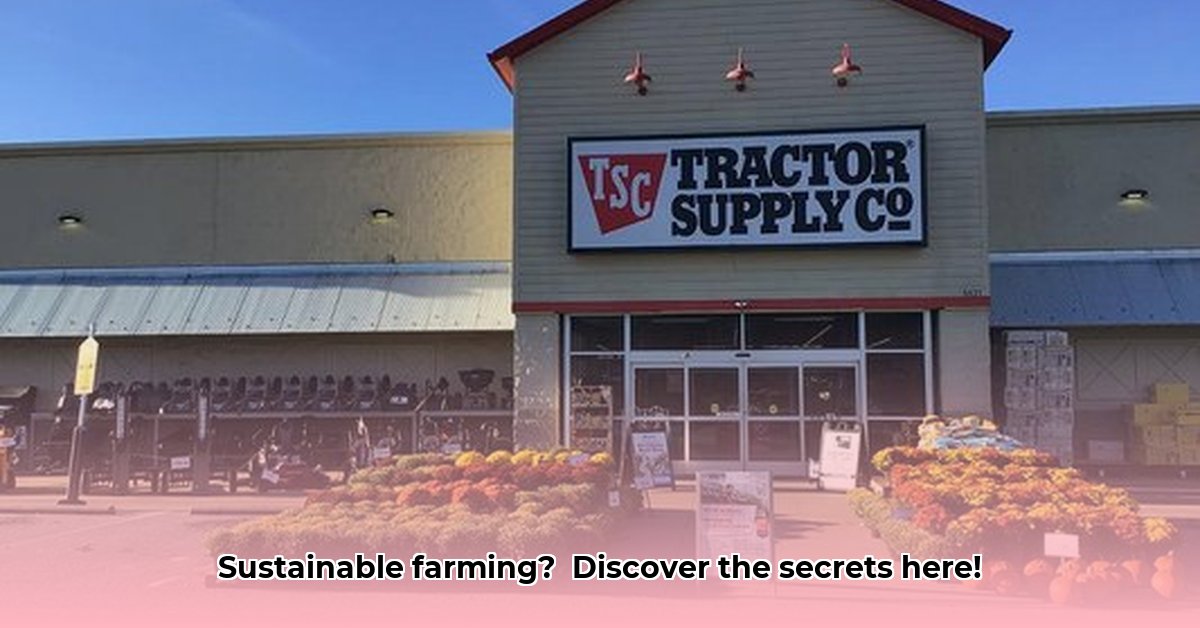
Tractor Supply's Role in Elizabeth City's Sustainable Agriculture
Tractor Supply Company (TSC) in Elizabeth City offers a valuable, albeit multifaceted, contribution to the region's sustainable agriculture efforts. This article examines TSC's offerings, analyzes its impact on both small-scale and larger farming operations, and provides actionable recommendations for enhancing its role in promoting environmentally responsible practices. We'll explore opportunities for improvement, highlighting collaborative efforts between TSC, local farmers, government, and consumers to build a more sustainable future for Elizabeth City's agricultural landscape. For more information on essential farming equipment, check out TSC's rototillers.
What Elizabeth City Tractor Supply Offers for Sustainable Farming
ECTS stocks a broad range of products relevant to sustainable agriculture. This includes organic seeds (though the selection could be expanded), water-efficient irrigation systems, tools for efficient gardening and farming practices, and various livestock supplies catering to responsible animal husbandry. The availability of these items makes sustainable farming practices more accessible to a wider range of producers, from small-scale home gardeners to larger farms. However, the extent to which these items truly support long-term sustainability depends on various factors, including the sourcing and manufacturing processes of the products themselves.
Analyzing Tractor Supply's Impact: Strengths and Limitations
While TSC provides convenient access to crucial supplies, its current impact on sustainable agriculture is nuanced. Small-scale farmers and home gardeners greatly benefit from the accessibility of basic supplies, making sustainable practices more feasible for them. However, larger farms often require specialized equipment and advanced technologies not typically found at TSC, limiting its direct contribution to their sustainable operations. Furthermore, a lack of transparent information regarding the sustainability credentials of certain products presents a challenge. Knowing the origin of materials, manufacturing processes, and the overall environmental footprint of each product would greatly enhance TSC's contributions to sustainable farming. For instance, while organic seeds are available, the proportion of organically-sourced products compared to conventionally produced ones needs further attention.
Opportunities and Challenges for Sustainable Growth in Elizabeth City
A significant challenge lies in scaling up the adoption of sustainable practices among larger farms in the Elizabeth City area. This requires a concerted effort involving technological advancements, economic incentives, and access to knowledge and expertise. Nevertheless, significant opportunities exist to substantially improve the sustainability of the local agricultural sector. One key opportunity is strengthening the partnership between TSC and local sustainable farms by showcasing their products and promoting their ethos within the store. Workshops on sustainable farming techniques, led by experts and hosted by TSC, could further educate both farmers and consumers. Another opportunity lies in working closely with local authorities to promote incentives and education programs that encourage the adoption of sustainable methods.
Actionable Recommendations for a Greener Future
To foster truly sustainable agriculture in Elizabeth City, collaborative action is essential. Here are specific recommendations for key stakeholders:
For Elizabeth City Tractor Supply:
- Expand Sustainable Product Offerings: Increase the range of organic seeds, eco-friendly pest control options, and water-saving irrigation systems to cater to the diverse needs of various farming operations.
- Invest in Staff Training: Equip employees with sufficient knowledge on sustainable farming practices to provide informed advice to customers. Focus on training regarding organic gardening, water conservation strategies, and the environmental impact of different farming methods.
- Enhance Product Transparency: Provide clear and detailed labeling, specifying the supply chains and manufacturing processes of all products, emphasizing sustainability credentials.
- Partner with Local Sustainable Farms: Feature locally-produced, and sustainably-grown goods to support local entrepreneurs and showcase exemplary sustainable practices.
For Local Farmers and Gardeners:
- Utilize Available Resources: Take full advantage of the sustainable products offered by TSC and other local suppliers.
- Engage in Educational Programs: Actively participate in workshops and training sessions to learn about the latest sustainable farming techniques.
- Network with Other Farmers: Share knowledge, experiences, and best practices to enhance collective learning and innovation.
For Local Government:
- Incentivize Sustainable Farming: Implement financial incentives, such as tax breaks or grants, to encourage the adoption of sustainable farming practices among both small and large producers.
- Invest in Educational Initiatives: Fund and support workshops, training programs, and educational campaigns to raise awareness and disseminate knowledge about sustainable agricultural practices.
For Consumers:
- Support Local Farmers: Prioritize buying locally-produced, sustainably-grown food from farmers' markets or direct from local farms.
- Demand Transparency: Actively inquire about the sustainability credentials of products purchased from TSC and other retailers to encourage greater transparency throughout the supply chain.
Conclusion: Building a Sustainable Future Together
The collaborative effort of Tractor Supply Company, local farmers, government, and consumers is crucial to creating a truly sustainable agricultural ecosystem in Elizabeth City. By implementing the actionable recommendations outlined above, the community can collectively work towards a future where environmentally responsible practices are the norm, ensuring a healthy and prosperous agricultural sector for generations to come. The journey may require ongoing adjustments and adaptations, but the long-term benefits for the region will be substantial.